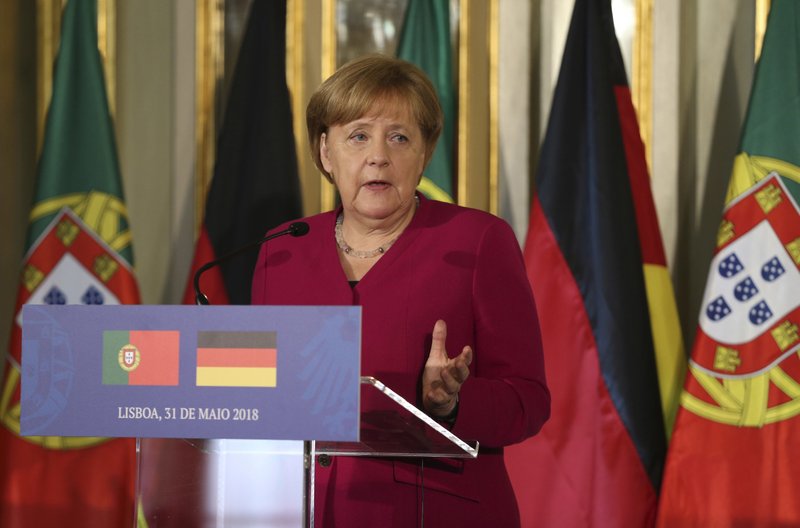BERLIN -- German Chancellor Angela Merkel laid out in a newspaper interview her ideas for more European integration, including the creation of a joint refugee agency that would determine asylum requests on the continent's borders.
In a changing global order, Europe "must be able to act, internally and externally, to be taken seriously by the world," Merkel said in a wide-ranging interview with the Frankfurter Allegemeine newspaper published Sunday. She has said in the past that Europe can no longer fully rely on others and that it must take its fate into its own hand, alluding to disagreements with U.S. President Donald Trump.
Merkel refrained from outright criticism of Trump in her comments to the newspaper, but noted that the U.S. has withdrawn from multilateral agreements and imposed new tariffs on steel and aluminum imports, including from Europe.
The chancellor spoke at a time of new concern about cohesion in the 28-member European Union, after a populist coalition with a strong anti-EU streak was installed in Italy last week.
Italy's new interior minister, Matteo Salvini, has said that Italians "aren't the slaves" of EU powerhouses Germany and France.
Merkel said in the interview that she will approach the new government with an open mind and try to work with it "instead of speculating about its intentions."
Asked about Salvini's comments, she said that "it's best to focus on talking about the issues" with Italy, Europe's fourth-largest economy.
The chancellor has invited Italy's new prime minister, Guiseppe Conte, to visit Germany.
Her comments Sunday were portrayed by the newspaper as a long-awaited response to French President Emmanuel Macron's ambitious plans for Europe, laid out in a speech last fall.
Merkel's proposals appeared to be somewhat more cautious, but with many points of agreement with her closest European ally.
Macron had proposed a joint budget for European countries sharing the euro currency that would allow investment in European projects and help stabilize the eurozone in case of economic crisis. He also called for a shared European military intervention force and defense budget.
To deal with Europe's migration flux, Macron called for a European asylum agency and standard EU identity documents.
Merkel said in Sunday's interview that she supports creating a European Monetary Fund -- similar to the International Monetary Fund -- that could help stabilize the eurozone by offering long- or short-term loans to member nations.
She also backed the idea of an investment fund, "in the low double-digit billions" of euros, to help EU members close development gaps.
The chancellor called for the establishment of a European refugee agency that would handle requests for asylum, based on unified asylum law, on Europe's borders.
She said she views Macron's idea of a joint intervention force "positively," but that many details would have to be worked out.
Also Sunday, Germany's president asked gays for forgiveness for decades of suffering and injustice they endured as a result of repressive laws in Germany in the Nazi era and after World War II.
Frank-Walter Steinmeier spoke Sunday in a ceremony marking the persecution of gays by the Hitler regime.
The dpa news agency quoted Steinmeier as saying that the harsh treatment continued in the post-war era, in both parts of a then-divided Germany, where homosexuality for years remained a criminal offense.
The president says that "this is why I'm asking for forgiveness today, for all the suffering and injustice, and the silence that followed."
Steinmeier says he wants to reassure "all gays, lesbians and bisexuals, all queers, trans- and intersexuals" that they are protected in today's Germany.
A Section on 06/04/2018

